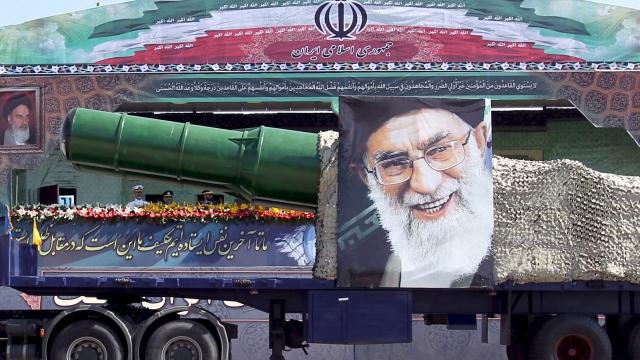
Trump’s new Iran strategy somehow ignores the lesson he should have learned from North Korea
http://ift.tt/2yeamFB
Raheb Homavandi/Reuters
The White House released its new Iran strategy on Friday morning, ahead of an expected announcement by President Donald Trump that current policy isn’t working.
Trump is expected to say that the 2015 Joint Comprehensive Plan of Action, more commonly known as the Iran Deal, is not in the US’s national security interests.
But the updated strategy, while acknowledging the legitimate threat Iran poses to US foreign policy goals and the region, has a fatal flaw.
In short, Trump’s new strategy will look to neutralize Iran’s "destabilizing" influence, constrain its "aggression, particularly its support for terrorism and militants," as well as the Islamic Revolutionary Guard Corps (IRGC), all while denying Iran "all paths to a nuclear weapon," most likely without the Iran deal, according to a White House statement.
Trump’s administration hopes to achieve these goals by denying funding to Iran, cracking down on the IRGC’s business dealings, countering Iran’s ballistic missile threat with forces of its own, and working with US allies in the region.
But the strategy somehow ignores Trump’s own foreign policy on North Korea.
Time and time again, Trump has repeated that sanctions do not and have not worked against North Korea. Denying funding, working with regional allies, and deploying forces to counter North Korea’s threat have not stopped the rogue nation from going nuclear.
Why would they work on Iran, whose GDP is over 30 times greater?
One reason sanctions don’t work to prevent nuclear proliferation is the fallacy of a supply-side cure.
The US cracked the atom and built an atomic bomb for the first time in 1945. By 1961 the US had fielded an intercontinental ballistic missile.
US Department of Energy
Most of the tools and techniques needed to create a nuclear force have existed for 40 to 50 years, according to Jeffrey Lewis, Director of the East Asia Nonproliferation Program at the Middlebury Institute of International Studies.
He told Business Insider: "They’re state of the 1970s." Iran could easily acquire nuclear materials and mount them to its already-imposing fleet of ballistic missiles.
TwitterTrump’s fatal flaw in preventing an Iranian nuclear weapon comes from the supply side approach.
"You have to deal with the demand side," said Lewis. "The idea that we’re going to keep the Iranians so stupid that they can’t make an ICBM is hopeless… you’re not going to permanently keep Iran at 1952."
As Suzanne Maloney, a former US State Department policy advisor, wrote on the Lawfare national security blog, Washington needs "a credible strategy for addressing the perennial, unresolved question of how to persuade Tehran to play a more constructive role at home and abroad," rather than a relitigated Iran deal.
But by increasing ties with Iran’s sworn rivals the Saudis, and other Gulf Arab states; by increasing US forces in the region, and by removing the economic benefits Iran enjoys from not pursuing a nuclear weapon and perhaps even designating the IRGC as a terrorist group, Iran will likely only see more reasons to go nuclear.
NOW WATCH: Watch an F-35 fighter jet use a ski jump as a runway
See Also:
- Mattis warned the military to ‘be ready’ for what Trump decides to do about North Korea
- Trump’s fiery, furious threats to ‘totally destroy’ North Korea might just work
- North Korean hackers may have stolen secret US-South Korean war plans to kill Kim Jong Un
SEE ALSO: Trump lists grievances, appears ready to leave the Iran deal
business
via Business Insider http://ift.tt/eKERsB
